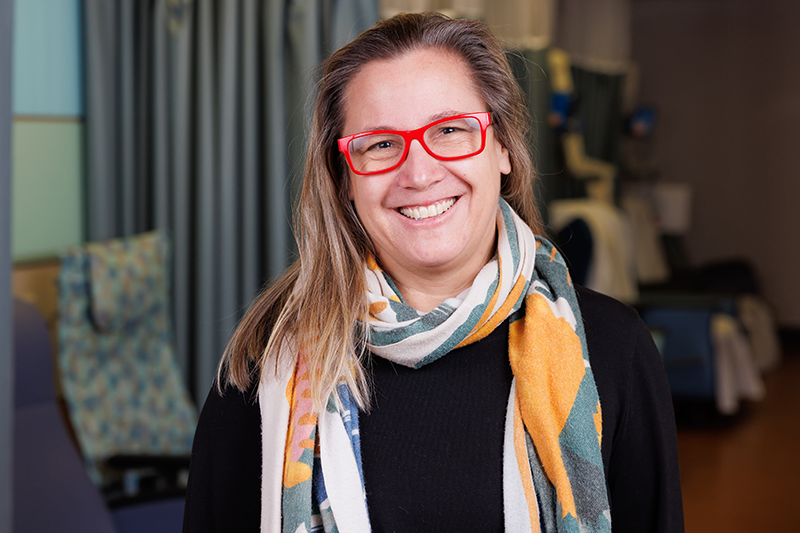
Dr. Julie Wolfson is the founder of the Adolescent and Young Adult Oncology and Oncofertility Program at Children’s of Alabama.
It might surprise many people to learn that cancer survival rates have been showing continual improvement in children under 14 and mature adults, but not among the 15-to-39-year-old age group. The Adolescent and Young Adult (AYA) Oncology and Oncofertility Program at Children’s of Alabama is aiming to change that.
When Julie Wolfson, M.D., MSHS, pediatric oncologist at Children’s of Alabama and founder of the AYA Program, was learning about healthcare delivery a decade ago, she noticed the survival disparities for adolescents and young adults and began to investigate how it could be addressed. She researched registry data and found that across a host of different diagnoses, survival rates were better when patients treated at a National Cancer Institute-designated Comprehensive Cancer Center.
She began to focus her research on understanding why. And she became determined to ensure the highest level of care for adolescents and young adults at Children’s of Alabama. In 2018, using seed money from the Hyundai Hope on Wheels Foundation, Wolfson launched the AYA program, which provides clinical treatment support and an array of psychosocial support services vital for patients in the adolescent to young adult stage of life.
“These patients are in a really vulnerable time in their social, emotional and physical development,” Wolfson says. “While their friends are at college, they have to come home. They were independent, and suddenly, they’re back under their parents’ roof, or they’re working and they don’t have help. When their peers keep growing and doing normal young adult things, they’re stalled, and they don’t feel well.”
To address these issues, the AYA Program offers wraparound, multidisciplinary services. “An AYA social worker meets with every patient to figure out what they can help with that is AYA-specific. They also connect with their assigned hematology-oncology social worker and the Hope and Cope Program for any psychosocial support needs or provides resources outside the institution,” Wolfson explains.
Preserving Fertility for Young Adults with Cancer
Unfortunately, getting treatment for cancer can put patients at risk for not being able to have their own children later on. One of the things that Wolfson is trying to do through her partnership with the director of fertility preservation is increase the number of patients who undergo fertility preservation. “The director and I are very much partners in this, and she bends over backwards to get our kids in,” Wolfson said. The oncofertility program allows young patients to bank sperm or extract and preserve eggs. Soon, they will also be able to take advantage of a relatively new process that allows for cryopreservation of ovarian tissue that can be re-implanted later when they are ready to have children.
Wolfson also reports that survival improvement in the AYA group is correlated to clinical trial participation, so enrolling AYA patients into as many clinical trials as possible is a key focus area for the program. “Our treatment and our care of these patients only has a chance to get better if they’re treated in a research study,” Wolfson said. “When you look at pediatric oncology, well over 70% to 75% of the patients are enrolled in a clinical trial, but it’s very different the older patients get.” As the patients age, the proportion of those who are enrolled in clinical trials drops. For this reason, Wolfson tries to ensure the AYA group has access to appropriate trials.
Ultimately, everyone’s mission is to ensure that each patient gets the best treatment possible. “This age group can walk through either door—pediatric oncology or adult oncology,” Wolfson said. As a result, the pediatric oncology team works hand-in-hand with their counterparts on the adult oncology staff to make sure all patient care options are examined. This interdisciplinary approach is carried out at monthly tumor board meetings and with paired disease specialists—one from the pediatric side, one from the adult side—who bring a deeper understanding to leukemia, lymphoma, sarcoma, neuro-oncology, genitourinary and gynecological oncology and more. Radiologists, pathologists and other specialists also bring their expertise to bear.
Since AYA’s launch, Wolfson has received investments from the O’Neal Comprehensive Cancer Center and the Vestavia Hills High School service-learning project, RISE.
“It’s outstanding to have the support of the leadership from Children’s of Alabama, as well as University of Alabama at Birmingham and the O’Neal Comprehensive Cancer Center,” Wolfson said. “It’s pretty unique.”

No Comments